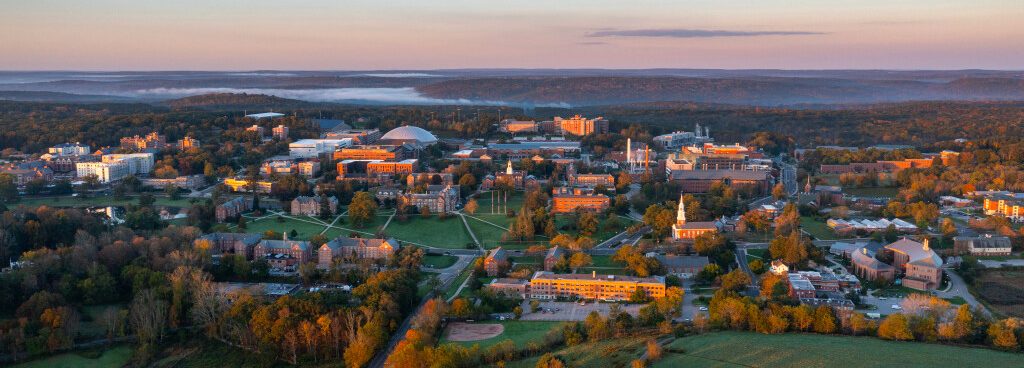
Academics
Educating the next generation of sustainability leaders
Environmental Literacy General Education Requirement
In 2019, UConn implemented an environmental literacy general education requirement as part of all undergraduate students' general course responsibilities. The environmental literacy, or 'E' courses, ensure that students engage with environmental and sustainability issues and topics within their chosen field of study. All undergraduate students are required to pass at least one three-credit Environmental Literacy course, all of which include sustainability learning outcomes. Use the course search feature below to look through the current E courses available for Fall 2024! (To view only the E courses available, choose 'COMPE' under the Content Area filter.)
Sustainability Related Academic Programs
UConn offers a wide range of majors and minors for students looking to pursue a degree in an environmental or sustainability related field. There are also graduate and master's level programs available for those looking to take their career to the next step.
Sustainability FOCUSED Courses Sustainability RELATED Courses
Undergraduate Programs
Agriculture and Natural Resources
Agriculture and Resource Economics
Animal Science
Anthropology
Biodiversity & Conservation Biology
Biological Sciences
Biomedical Engineering
Biophysics
Chemical Engineering
Chemistry
Ecology and Evolutionary Biology
Electrical Engineering
Environmental Engineering
Environmental Health
Environmental Science
Environmental Studies
Geography
Geoscience
Health Care Management
Horticulture
Molecular and Cell Biology
Natural Resources
Nutritional Science
Pathobiology
Physiology and Neurobiology
Real Estate/Urban Economics
Resource Economics
Science Education
Turfgrass and Soil Science
Urban and Community Studies
Graduate Degree Programs
Master's of Energy and Environmental Management (MEEM)
The Master's of Energy and Environmental Management (MEEM) program is an online graduate program offered by the University of Connecticut. The course requires 30 total credits, including 27 coursework credits and 3 credits of internship/practical experience. The MEEM program combines multi-disciplinary classroom knowledge with the real-world experiences to prepare a new cohort of environmental and energy leaders to make positive impacts in their communities. To learn more and apply for the program, visit the webpage at the link below.
Learn more about the MEEM Program
All Master's and Ph.D. Programs:
Advanced Manufacturing for Energy Systems (M.S.)
Agricultural and Resource Economics (Ph.D.)
Animal Science (M.S., Ph.D.)
Anthropology (M.A., Ph.D.)
Applied and Resource Economics (M.S.)
Applied Biochemistry and Cell Biology (M.S.)
Biodiversity and Conservation Biology (M.S.)
Biomedical Engineering (M.S., Ph.D.)
Biomedical Science (M.S., Ph.D.)
Chemical Engineering (M.S., Ph.D.)
Chemistry (M.S., Ph.D.)
Ecology and Evolutionary Biology (M.S., Ph.D.)
Electrical Engineering (M.S., Ph.D.)
Energy and Environmental Management (M.S.)
Environmental Earth Sciences (M.S.)
Environmental Engineering (M.S., Ph.D.)
Geography (M.A., Ph.D.)
Geological Sciences (M.S., Ph.D.)
Health Promotion Sciences (M.S., Ph.D.)
Human Rights (Certificate, M.A.)
Intersectional Indigeneity, Race, Ethnicity, and Politics (Certificate, M.A.)
Molecular and Cell Biology (M.S., Ph.D.)
Natural Resources: Land, Water, and Air (M.S., Ph.D.)
Nutritional Science (M.S., Ph.D.)
Oceanography (M.S., Ph.D.)
Pathobiology (M.S., Ph.D.)
Physiology and Neurobiology (M.S., Ph.D.)
Plant Science (M.S., Ph.D.)
Public Administration (M.P.A.)
Public Health (M.P.H., Ph.D.)
Public Policy (M.P.P.)
Graduate Certificate Programs
Sustainable Environmental Planning Management (SEPM) Graduate Certificate
The Sustainable Environmental Planning Management (SEPM) Graduate Certificate is a 12-credit, 100% online program designed to prepare participants for future schooling or a career in the "green jobs" industry. Over a completion time of 12 to 16 months, students learn about ecological systems and the factors that impact them (social, economic, political, etc.), develop geospatial skills, and learn to prepare and evaluate environmental management plans. Credits that students earn for the SEPM program can also be applied to the Master's of Energy and Environmental Management (see above!).
Learn more about the SEPM program here
All Certificates:
Advanced Materials Characterization
Advanced Systems Engineering
Biomedical Science Research Experience
College Instruction
Composites Engineering
Contaminated Site Remediation
Corporate and Regulatory Compliance
Culture, Health, and Human Development
Diversity Science
Emerging Women’s Leadership
Energy and Environmental Law (JD Certificate from UConn Law)
Foundations of Public Health
Geographic Information Systems
Global Health
Global Risk Management (Currently not accepting applications)
Human Rights (M.A. also offered)
Intersectional Indigeneity, Race, Ethnicity, and Politics (M.A. also offered)
Leadership and Public Management
Nonprofit Management
Occupational Safety and Health
Oceanographic Science and Technology
Power Engineering
Power Grid Modernization
Process Engineering
Project Management
Remote Sensing and Geospatial Data Analytics
Supply Chain Analytics
Survey Research
Sustainable Environmental Planning and Management
Non-degree Programs
Master Gardener Program from UConn Extension
Garden Master classes are designed for those who want to learn more about horticulture and natural resources. Students take place in a 16-week course including training in botany, pesticide safety, pest management, water quality, invasive plants, and much more, followed by a 60-hour internship program. The Master Gardener Program begins annually in January and applications are typically posted in mid August the previous year. Classes are held once per week from 9:00am to 1:00pm. To learn more about the UConn Master Gardener Program, visit the link below.
Learn more about the Master Gardener Program here
UConn Extension offers an extensive range of online and in-person non-degree courses, including the Master Gardener program detailed above, the Online Vegetable Production Certificate, DEEP Aquifer Training, and more. To learn more about the programs offered by Extension, visit the link below.
View all online courses and programs from UConn Extension
